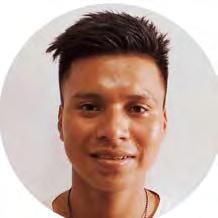
1 minute read
Thoughts from Youth Fellows
The beauty of this process was learning the oral tradition and identifying that much of the knowledge resides in it, and it is important to make it known to the new generation so that they embrace it and continue the process.”
The youth received training in preparation of communications about what is happening in the territories, how to inform through social media, dissemination of information, use of social networks, [and] what, when, how, and to whom to communicate. All this allowed them to continue reporting the realities of what is happening in the territories of the Choco Indigenous communities so that pertinent actions can be taken. Thanks to the training opportunity, it allowed us to have trained people in communications within our organization.”
- Jhon Andres Duave Serezo (Embera Katio), Colombia


I wanted to empower the youth of Ladakh, especially the ones who come from remote areas, and give them a platform where they can practice speaking up for themselves and their rights so that they could help themselves first and then others with a collective goal to protect Indigenous culture, tradition, and environment. The fellowship gave many opportunities. I was once invited for an interview at All India Radio in Leh. By doing this fellowship, I became more confident and started believing in myself.”

The Cultural Survival Youth Fellowship has been a true blessing. It has opened my mind and my heart up to so much. This fellowship has positively forced me into a spiritual healing, one that begins at the root of who I am.
I am now able to face the pain and suffering that my people went through and help articulate it in a comprehensible way. It has also allowed me to see the violations of people’s rights, as well as the unseen aspects of life that go unnoticed due to conditioning and separation from our roots.

I am thankful to have been part of Cultural Survival for this short period, as they work with love and courage to remove the poison from the systems of our global Indigenous communities by empowering us as youth.”










